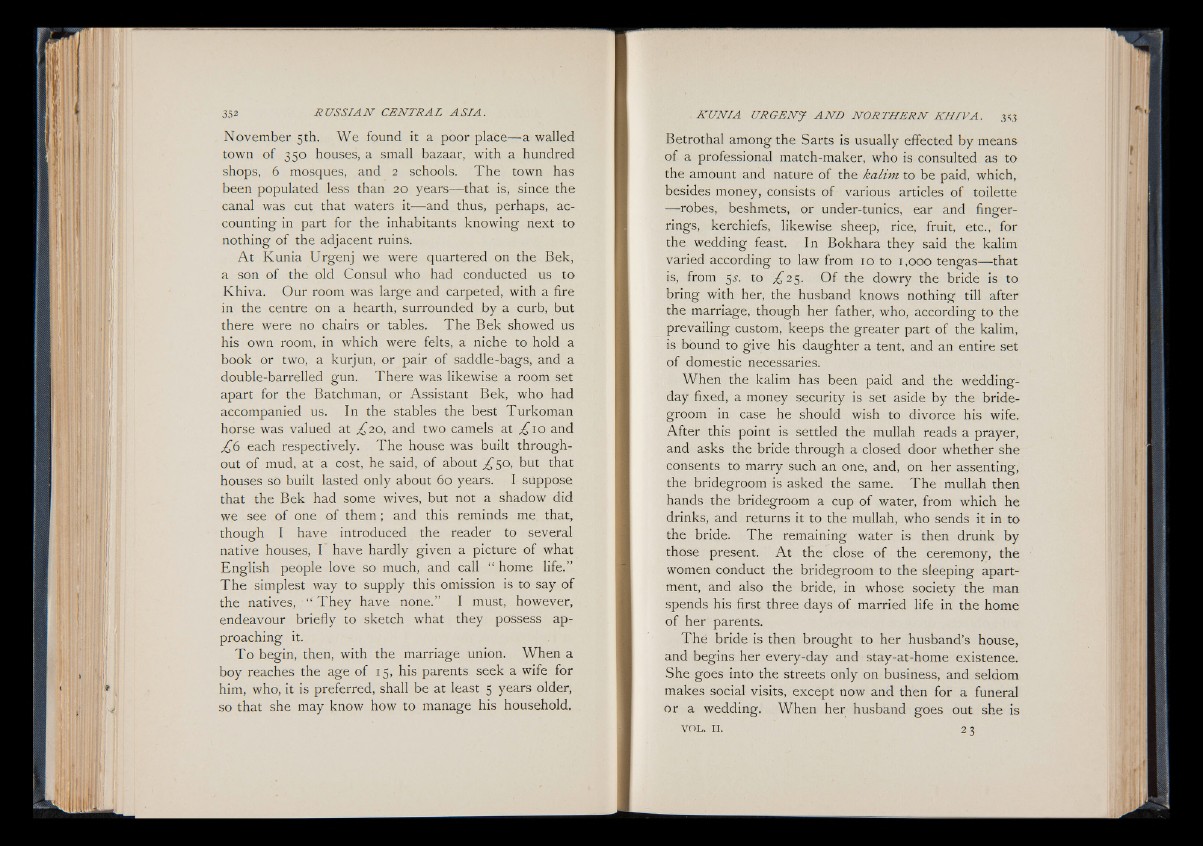
November 5th. We found it a poor place— a walled
town of 350 houses, a small bazaar, with a hundred
shops, 6 mosques, and 2 schools. The town has
been populated less than 20 years— that is, since the
canal was cut that waters it— and thus, perhaps, accounting
in part for the inhabitants knowing next to
nothing of the adjacent ruins.
A t Kunia Urgenj we were quartered on the Bek,
a son of the old Consul who had conducted us to
Khiva. Our room was large and carpeted, with a fire
in the centre on a hearth, surrounded by a curb, but
there were no chairs or tables. The Bek showed us
his own room, in which were felts, a niche to hold a
book or two, a kurjun, or pair of saddle-bags, and a
double-barrelled gun. There was likewise a room set
apart for the Batchman, or Assistant Bek, who had
accompanied us. In the stables the best Turkoman
horse was valued at £20, and two camels at ^ 10 and
£ 6 each respectively. The house was built throughout
of mud, at a cost, he said, of about ,£50, but that
houses so built lasted only about 60 years. I-suppose
that the Bek had some wives, but not a shadow did
we see of one of them ; and this reminds me that,
though I have introduced the reader to several
native houses, I have hardly given a picture of what
English people love so much, and call “ home life.”
The simplest way to supply this omission is to say of
the natives, “ They have none.” I must, however,
endeavour briefly to sketch what they possess approaching
it.
T o begin, then, with the marriage union. When a
boy reaches the age of 15, his parents seek a wife for
him, who, it is preferred, shall be at least 5 years older,
so that she may know how to manage his household.
Betrothal among the Sarts is usually effected by means
of a professional match-maker, who is consulted as to
the amount and nature of the kalirn to be paid, which,
besides money, consists of various articles of toilette
— robes, beshmets, or under-tunics, ear and finger-
rings, kerchiefs, likewise sheep, rice, fruit, etc., for
the wedding feast. In Bokhara they said the kalim
varied according to law from 10 to 1,000 tengas— that
is, from 53-, to £2$. O f the dowry the bride is to
bring with her, the husband knows nothing till after
the marriage, though her father, who, according to the
prevailing custom, keeps the greater part of the kalim,
is bound to give his daughter a tent, and an entire set
of domestic necessaries.
When the kalim has been paid and the wedding-
day fixed, a money security is set aside by the bridegroom
in case he should wish to divorce his wife.
After this point is settled the mullah reads a prayer,
and asks the bride through a closed door whether she
consents to marry such an one, and, on her assenting,
the bridegroom is asked the same. The mullah then
hands the bridegroom a cup of water, from which he
drinks, and returns it to the mullah, who sends it in to
the bride. The remaining water is then drunk by
those present. A t the close of the ceremony, the
women conduct the bridegroom to the sleeping apartment,
and also the bride, in whose society the man
spends his first three days of married life in the home
of her parents.
Thé bride is then brought to her husband’s house,
and begins her every-day and stay-at-home existence.
She goes into the streets only on business, and seldom
makes social visits, except now and then for a funeral
or a wedding. When her husband goes out she is
v o l . 11. 23